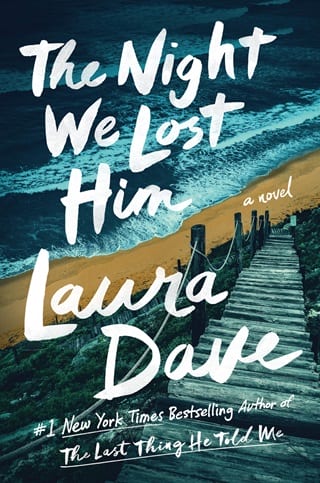10. Old Friends Are the Best Friends
Old Friends Are the Best Friends
"She's awful," Sam says.
"She didn't seem awful."
He shakes his head. "That's what makes her so awful."
We are walking back to the car, the sky dark and starlit, the main street now quiet and mostly emptied out. Sam is upset, too upset to be rational. So I take the keys out of his hands, work it through in my mind. Why would our father have called Cece that night? Could he have been rethinking the sale? Possibly. But it feels more likely to me that he would have reactivated that interest through other channels, more official channels. Uncle Joe.
No, it was something else. Two missed nighttime calls. No message. If I'm guessing, it was something more personal.
"She has an agenda here, I'm telling you," Sam says.
"What does that mean, Sam?"
"There's something she doesn't want us to know."
I pull my sweater more tightly around myself and consider what he's saying. "I don't disagree with you on that," I say. "Cece was being evasive."
"Thank you."
"But when I said we had concerns about what happened to him that night, she looked worried, Sam. She looked worried about him in a way that made me wonder—"
"How deep they went?"
I nod. I picture Cece's beautiful face, her confidence, her strength. It wasn't a leap to picture my father being enraptured by all of it. It wasn't a leap to picture my father being enraptured by her.
"Something like that."
He looks down and opens the passenger-side door. I get in on the driver's side, key the ignition, turn the headlights on. I feel it bubbling up—the possibility that's been coming at me all day, a possibility that would explain why our father went to Windbreak unannounced. Why he tripped and fell over the edge of a landscape he knew too well.
"You don't think Dad hurt himself, do you?" I say before I can stop myself.
Sam gives me a look. "Like jumped? No way."
"I know Detective O'Brien says that they ruled out self-harm. But I'm not convinced by anything he said."
"That I agree on—"
"Look, I'm just saying we should talk it through. You're the one who keeps telling me he wasn't himself. And he's finalizing his will. And now we hear that he's making weird phone calls. Don't we have to at least consider it?"
Sam gets quiet, and I can see him turning the idea over in his head. All the details could add up to point that way, especially after today. The canceled sale, Uncle Joe's defiance, the calls to Cece. The disconnected calls to her, which may be the weirdest puzzle piece yet.
As an architect, I often think in terms of puzzle pieces. I've learned, over time, that a requirement of the job is to find a simple and elegant solution that addresses all the complexities inherent in any project. That makes all the disparate pieces fit together. When I find that right answer, I can almost hear it all click into place, the whole picture coming into a unifying focus. This is the way I'm supposed to go.
But this answer isn't clicking. Our father was wired for problem-solving—it was what made him so good at his job. He always said that he and I had that in common. Which made it feel clearer to me: even if he was facing something that felt insurmountable to him, he would be too stubborn to give in to it. He wouldn't give in to anything, not until he believed that he had managed to come out the other side.
Plus, there was the other thing that would push him away from doing anything to hurt himself, no matter what was going on. His children. And if he couldn't fight against his sadness (if he couldn't overcome what ailed him), he would leave us notes, he would leave us an explanation, he would leave instructions. He wouldn't just leave.
"No," Sam says, getting there too. "No way. I don't believe it. That's not what this is."
I'm glad that he's gotten there too. I'm relieved that, whatever this is, we agree it's not anything self-inflicted.
But before that can bring too much relief, I realize something else. I realize that the possibility has been swirling around in me because it's moving me closer to it: What's hitting me hard. What I do think is more than possible. What I believe now to be true. In someone I knew less well, I'd ascribe his strange behavior to depression, to being unsettled. But I knew that with my father it wasn't as simple as that.
My father was up against something that maybe, for the first time, he couldn't find his way through.
 Fullepub
Fullepub 



